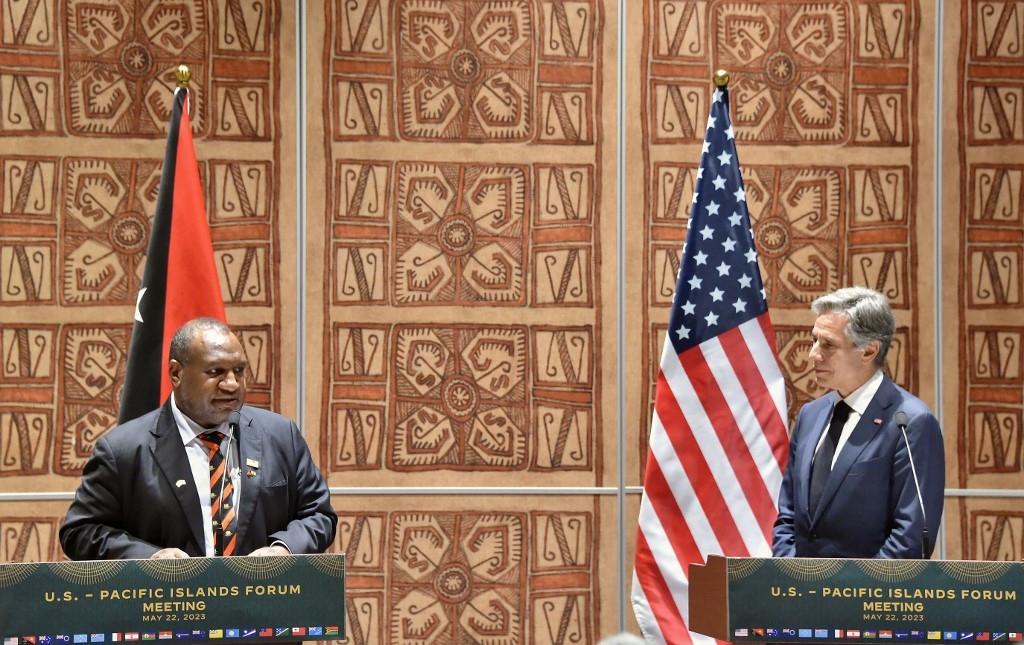Popular Reads
Top Results
Can't find what you're looking for?
View all search resultsPopular Reads
Top Results
Can't find what you're looking for?
View all search resultsThe US-PNG defense pact
Due to the possibility of the deal bringing about a shift in regional power dynamics, Indonesia should engage in diplomacy with both the US and PNG to ensure its concerns are heard and addressed.
Change text size
Gift Premium Articles
to Anyone
T
he newly signed defense and maritime cooperation agreement between Papua New Guinea (PNG) and the United States will not only exacerbate the ongoing great power rivalry in the Asia Pacific region but also give us a cause for concern because we share a border with PNG.
Depending on the details of the deal, sooner or later the bilateral agreement will affect our national security, for better or worse.
China’s Foreign Ministry spokesperson Mao Ning said Beijing had no objection to such a form of cooperation, but quickly added, "What we need to be vigilant about is engaging in geopolitical games in the name of cooperation, and we also believe that no cooperation should target any third parties."
Beijing has shown a growing interest in Pacific Islands. Last year, then-Chinese foreign minister Wang Yi signed a security pact with the Solomon Islands as part of his trip to eight Pacific Islands states that badly need financial funding to mitigate the risks of climate change.
Australia, the most prominent neighbor of the Pacific nations, is losing its grip on the region since China offers more lucrative deals.
As a part of the strategy to contain China, Australia, the United Kingdom and the US established a military pact, AUKUS, which allows Canberra to possess nuclear-powered submarines to protect its sovereignty. The US also formed another strategic alliance, the Quad, with Australia, Japan and India with rising China in mind.
After attending the Group of Seven summit in Hiroshima, Japan, last week, Biden was initially slated to visit PNG. He canceled the trip due to domestic politics and sent his state secretary, Antony Blinken, instead.
The US-PNG agreement was signed by Blinken and PNG's Defense Minister Win Bakri Daki on the sidelines of the summit of the Pacific Islands Forum in Port Moresby on Monday. No details are available regarding the deal, but a leaked draft document suggests it gives US personnel and contractors legal immunity; allows aircraft, vehicles and vessels operated by or on behalf of the US to move freely within its territory and territorial waters and exempts US staff from all migration requirements.
The Associated Press quoted the US State Department as saying the new agreement provides a framework to help improve security cooperation, enhance the capacity of PNG’s defense force and increase regional stability.
PNG, the most populous Pacific Island nation, saw fierce battles during World War II.
Indonesia may choose to closely monitor the developments of the US-PNG deal and assess how it may impact its national security interests, although the full extent of the repercussions of the agreement will depend on various factors, including the specifics of the deal and the reactions of other regional powers, including China, whose influence in the region is growing.
Due to the possibility of the deal bringing about a shift in regional power dynamics, especially because it can increase the presence of the US and its allies like Australia and Japan, Indonesia should engage in diplomacy with both the US and PNG to ensure its concerns are heard and addressed.
Papua, which abuts PNG, is rich in natural resources but has for over a few decades been beset by a separatist movement. The rebel group has been holding a New Zealand pilot hostage in its stronghold of Nduga highland regency since February.
Papua is also home to the US valuable asset in PT Freeport Indonesia, one of the world’s largest copper and gold mines, which in 2018 was acquired by Indonesia. Under nationalist-leaning President Joko “Jokowi” Widodo, Indonesia increased its shares in Freeport to 51.23 percent in a divestment deal worth US$3.85 billion.
The PNG-US security pact amounts to a national security interest for Indonesia. Jakarta must communicate with both Washington and Port Moresby to prevent unwanted implications of any increase in the US military presence in our neighboring country.











